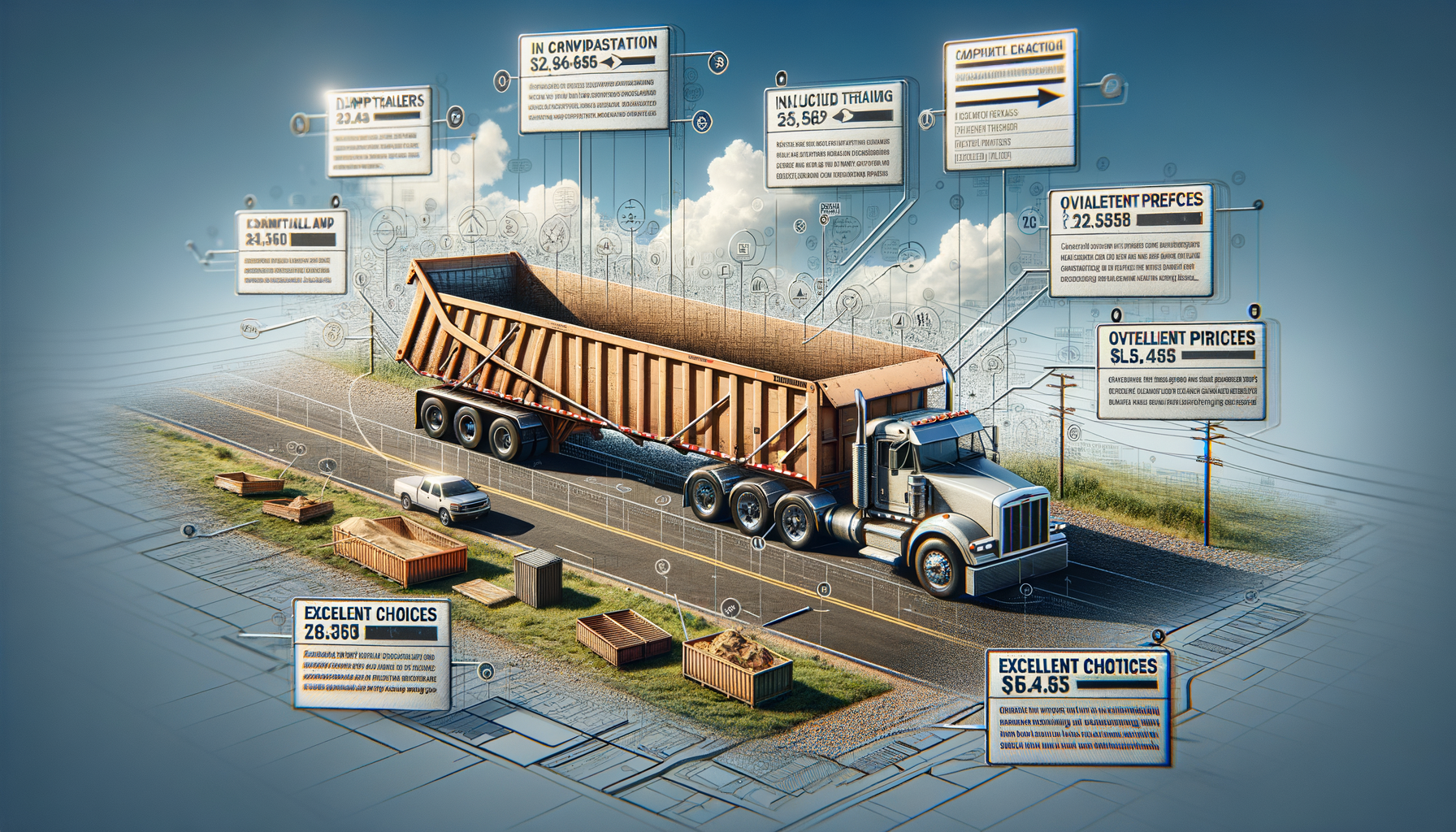
A Detailed Analysis on Dump Trailers: Understanding Pricing, Sizing, and Locating Exceptional Choices Near You
Understanding Dump Trailer Costs
When delving into the world of dump trailers, understanding the factors that affect their cost is paramount. Prices can vary widely based on several key elements. Firstly, the size of the trailer plays a significant role. Larger trailers, such as 7×14 models, naturally command higher prices compared to more compact versions like the 5×10. The material used in construction also impacts cost; trailers made from heavier-duty steel are generally more expensive than those constructed from lighter materials.
Another critical factor is the type of dump mechanism. Hydraulic systems, known for their reliability and ease of use, often add to the overall cost. Additionally, features such as reinforced sides, tarp kits, and spare tire mounts can increase the price but offer added convenience and durability.
When considering purchasing a dump trailer, potential buyers should also factor in regional pricing differences and local market conditions. Researching local dealerships and comparing prices can provide a clearer picture of what to expect. Understanding these elements helps in making an informed decision, ensuring that the investment meets both budgetary constraints and functional needs.
Size Matters: Choosing the Right Dump Trailer
The size of a dump trailer is a crucial consideration that directly influences its utility and cost. Smaller trailers, such as the 5×10, are ideal for light-duty tasks, offering ease of maneuverability and storage. These are often favored by hobbyists or those with limited space. On the other hand, larger trailers, like the 7×14, provide ample capacity for heavy-duty tasks, making them suitable for professional use in construction or landscaping.
Choosing the right size involves assessing the typical loads you expect to carry. A trailer that’s too small may require multiple trips, while an oversized one could lead to unnecessary expenses and handling challenges. Additionally, consider the towing vehicle’s capacity to ensure compatibility and safe transportation.
Ultimately, the decision should balance the need for capacity with practical considerations such as storage space and towing capabilities. By evaluating these factors, buyers can select a trailer size that aligns with their operational requirements and budget.
Roll-Off vs. Standard Dump Trailers
Dump trailers come in various configurations, with roll-off and standard dump trailers being the most common. Understanding the differences between these types can guide buyers in selecting the appropriate model for their needs.
Standard dump trailers are equipped with a fixed bed that tilts to unload materials. These are typically more affordable and are suitable for straightforward dumping tasks. They are favored by those who need a reliable, no-frills solution for transporting and unloading materials.
Roll-off dump trailers, however, offer enhanced versatility. They allow for the container to be detached from the trailer, enabling users to leave the container at a job site and return with an empty trailer. This feature is particularly advantageous for businesses that require frequent loading and unloading at different locations.
When choosing between these options, consider the nature of your work. If your operations involve multiple sites and require flexibility, a roll-off trailer may be the better choice. For those focused on cost-effectiveness and simplicity, a standard dump trailer could suffice.
Renting vs. Buying: Weighing Your Options
Deciding whether to rent or buy a dump trailer involves weighing several factors. Renting can be an attractive option for those who only need a trailer for a short-term project or occasional use. It allows access to a variety of trailer sizes and types without the commitment of ownership.
Renting also eliminates maintenance concerns, as rental companies typically handle repairs and upkeep. However, frequent use can make renting more expensive over time compared to purchasing a trailer outright.
Buying a dump trailer is a significant investment but offers long-term benefits. Owners have the flexibility to use the trailer whenever needed and can customize it with additional features. Additionally, owning a trailer can be more cost-effective in the long run for those who require frequent use.
Ultimately, the decision depends on individual needs and financial considerations. Evaluating the frequency of use, budget, and specific requirements can help determine whether renting or buying is the more suitable option.
Locating Exceptional Dump Trailer Options Near You
Finding a highly-rated dump trailer in your vicinity involves thorough research and comparison. Start by exploring local dealerships and their offerings. Visiting these establishments allows you to physically inspect trailers, ask questions, and potentially negotiate prices.
Online platforms can also be valuable resources, providing access to customer reviews and ratings. These insights can guide you towards reputable dealers and well-regarded trailer models. Additionally, attending trade shows or industry events can offer opportunities to see a range of trailers and speak with manufacturers directly.
Another avenue is to seek recommendations from peers or industry professionals who have experience with dump trailers. Their firsthand insights can be invaluable in identifying reliable options.
By leveraging these resources, you can locate a dump trailer that meets your needs and budget, ensuring a satisfactory purchase experience.

